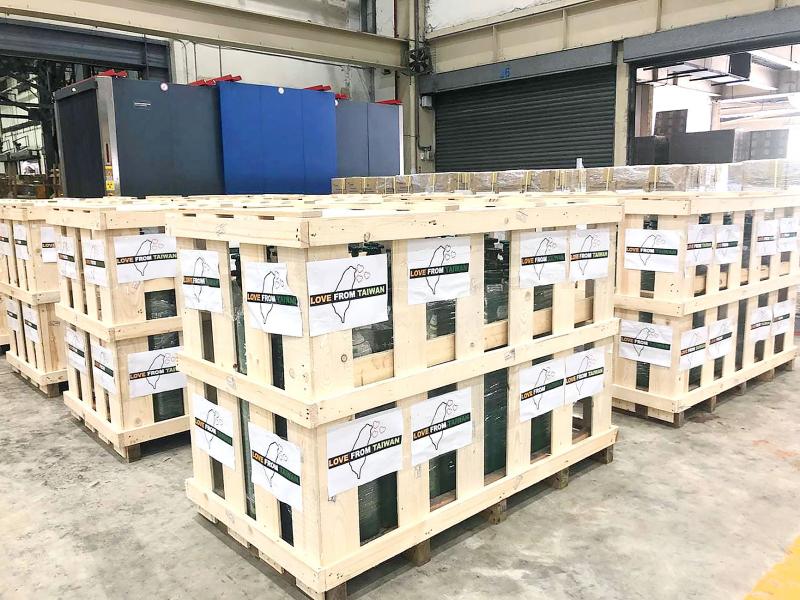A total of 150 oxygen concentrators and 500 oxygen cylinders donated by Taiwan arrived in India yesterday to support its fight against a raging second wave of COVID-19, the Ministry of Foreign Affairs said.
A China Airlines Ltd (中華航空) cargo plane loaded with supplies left Taiwan Taoyuan International Airport at about 7am and arrived at New Delhi’s Indira Gandhi International Airport at about 11am local time.
“These oxygen concentrators & cylinders are love from #Taiwan. More help for our friends in #India is on the way. #IndiaStayStrong! JW,” Minister of Foreign Affairs Joseph Wu (吳釗燮) wrote on Twitter.

Photo courtesy of the Ministry of Foreign Affairs via CNA
The supplies are to be given to the Indian Red Cross Society, which is in charge of coordinating all medical supplies donated by foreign governments to help India fight the COVID-19 pandemic, the ministry said in a news release.
More medical supplies would be sent to India in the near future, the ministry added.
India’s second wave of COVID-19 infections has devastated big cities such as New Delhi, Mumbai, Lucknow and Pune.
Only about 100 Taiwanese still reside in India, as a large number of them had returned to Taiwan due to the pandemic, the ministry said.
The most recent evacuation took place on Friday, when 14 Taiwanese left India on a Japan Airlines Co flight and landed in Taiwan on Saturday, it said.
A Taiwanese man on Saturday became the first Taiwanese citizen to die from COVID-19 in India.
The 49-year-old man surnamed Yang (楊), a manager at a technology company based in Gurugram in the northern state of Haryana, was pronounced dead after being hospitalized in the city earlier this week, said a source who asked to remain anonymous.
The company has informed Yang’s family, and plans to cremate his body before Taiwan’s representative office in India sends his ashes home, the source added.
Representative to India Baushuan Ger (葛葆萱) said that his office would do its best to help Yang’s family arrange his funeral.
Yang was among 11 Taiwanese in India infected with COVID-19.
The source said that Yang’s company has eight Taiwanese managers, all of whom had received China’s Sinovac vaccine.
Five of the eight contracted COVID-19 earlier this week, but only Yang developed more severe symptoms, the source said.
Yang had asked Taiwan’s representative office in India to transfer him to a better-equipped hospital before he died, the source added.
As of yesterday, India had reported more than 19.5 million COVID-19 cases and 215,542 deaths.
Minister of Health and Welfare Chen Shih-chung (陳時中), who heads the Central Epidemic Command Center, yesterday announced that starting at 12am tomorrow, travelers who have visited India in the past 14 days, including those who had transited through the nation, would be subject to centralized quarantine for 14 days.
They would need to take a polymerase chain reaction test upon ending quarantine and continue practicing self-health management at home for seven days, he said, adding that as it is a compulsory order, the government would pay the centralized quarantine fee.
Additional reporting by Lee I-chia

A Chinese aircraft carrier group entered Japan’s economic waters over the weekend, before exiting to conduct drills involving fighter jets, the Japanese Ministry of Defense said yesterday. The Liaoning aircraft carrier, two missile destroyers and one fast combat supply ship sailed about 300km southwest of Japan’s easternmost island of Minamitori on Saturday, a ministry statement said. It was the first time a Chinese aircraft carrier had entered that part of Japan’s exclusive economic zone (EEZ), a ministry spokesman said. “We think the Chinese military is trying to improve its operational capability and ability to conduct operations in distant areas,” the spokesman said. China’s growing

Nine retired generals from Taiwan, Japan and the US have been invited to participate in a tabletop exercise hosted by the Taipei School of Economics and Political Science Foundation tomorrow and Wednesday that simulates a potential Chinese invasion of Taiwan in 2030, the foundation said yesterday. The five retired Taiwanese generals would include retired admiral Lee Hsi-min (李喜明), joined by retired US Navy admiral Michael Mullen and former chief of staff of the Japan Self-Defense Forces general Shigeru Iwasaki, it said. The simulation aims to offer strategic insights into regional security and peace in the Taiwan Strait, it added. Foundation chair Huang Huang-hsiung

PUBLIC WARNING: The two students had been tricked into going to Hong Kong for a ‘high-paying’ job, which sent them to a scam center in Cambodia Police warned the public not to trust job advertisements touting high pay abroad following the return of two college students over the weekend who had been trafficked and forced to work at a cyberscam center in Cambodia. The two victims, surnamed Lee (李), 18, and Lin (林), 19, were interviewed by police after landing in Taiwan on Saturday. Taichung’s Chingshui Police Precinct said in a statement yesterday that the two students are good friends, and Lin had suspended her studies after seeing the ad promising good pay to work in Hong Kong. Lee’s grandfather on Thursday reported to police that Lee had sent

BUILDUP: US General Dan Caine said Chinese military maneuvers are not routine exercises, but instead are ‘rehearsals for a forced unification’ with Taiwan China poses an increasingly aggressive threat to the US and deterring Beijing is the Pentagon’s top regional priority amid its rapid military buildup and invasion drills near Taiwan, US Secretary of Defense Pete Hegseth said on Tuesday. “Our pacing threat is communist China,” Hegseth told the US House of Representatives Appropriations Subcommittee on Defense during an oversight hearing with US General Dan Caine, chairman of the Joint Chiefs of Staff. “Beijing is preparing for war in the Indo-Pacific as part of its broader strategy to dominate that region and then the world,” Hegseth said, adding that if it succeeds, it could derail